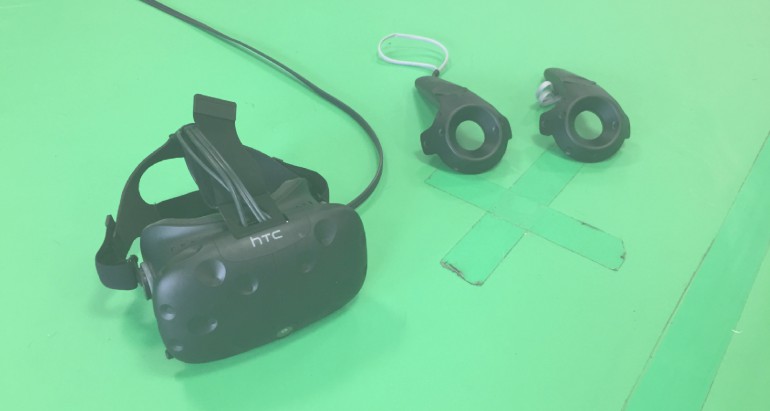
When it comes to excitement levels, one of the top moments of 2016 at the People for Research office was testing out virtual reality (VR) technology at CAMERA, the Centre for the Analysis of Motion, Entertainment Research and Applications, based in Bath. Not only did we learn about their interesting research and development work in the motion capture and video field, but we also had the privilege of touring through their VR lab and trying out the HTC Vive and a mind-blowing demo.
During our experience, we went from a park in Iceland to a magical shop thanks to the ‘experience factory’ that allowed us to visit different scenarios across the virtual realm. All of this whilst being followed around by our loyal robot puppy! Oh, it was fun.
The whole thing felt so immersive that, by the end of the demo, we weren’t sure how to leave the virtual domain and get back to the real world. It’s easy to forget that the only thing it takes is to remove the headset and that’s it: you are instantly transported to the real world.
How can VR be improved?
People for Research recently announced its first user recruitment project for the virtual reality sector, a niche industry that we are keen on learning more about. Despite the fact that, throughout the years, we have been recruiting participants with different levels of tech-savviness to take part in user experience (UX) and usability testing, there is always more to learn when a new group like VR users starts growing.
Although our experience with virtual reality was definitely interesting, there are some tweaks that still need to be made to improve the current technology. And this is where usability testing and market research come in, not only to understand what can be refined on a technical level, but also to capture the users’ motivations and demands.
1. The set-up time needs to be shortened
Setting up the environment where the users will enjoy virtual reality technology is still a complex and sometimes lengthy part of the process. It can take several minutes to make sure: the user has enough space to move around in a room; the hardware can recognise the space; the software is loaded and ready to go. Of course, this is only valid for software that requires movement in order to be enjoyed, like a game, but isn’t gaming one of the main industries that will benefit from VR?
2. The hardware needs to feel more organic
Users can get comfortable with pretty much anything, as long as they are receptive to it. However, even VR fans like ourselves must recognise that it still feels a bit weird at first to wear massive goggles connected to a wire that limits our movements. You get used to it, eventually, but there is definitely room for improvement here.
3. Virtual reality needs to conquer more senses
For now, it’s all about tricking your eyes and brain into thinking the virtual world is real, but what about sound and touch?
4. More content needs to be developed
It’s not only about creating better games and audio-visual content for VR, it’s also about diversifying the offer to conquer a broader audience. This would make the technology more relevant for different groups of users and not just for the hardcore gamers or movie lovers looking for a new experience. Focus groups and ethnographic observation studies will be extremely relevant in this scenario, to understand the motivations and necessities behind each new and current user’s mindset.
When you look past the ‘wow factor’, virtual reality still needs to become relevant in areas of real use such as training or even shopping. The VR industry won’t be able to fix all these issues right now, but 2017 is starting to look like the first big year for virtual reality testing. This will be the year when UX and usability professionals will hopefully focus not only on the technology, but also on the users’ needs and wishes.
![]() Maria Santos, Head of Digital Ops & Data Protection
Maria Santos, Head of Digital Ops & Data Protection
If you would like to find out more about our in-house participant recruitment service for user testing or market research get in touch on 0117 921 0008 or info@peopleforresearch.co.uk.
At People for Research, we recruit participants for UX and usability testing and market research. We work with award winning UX agencies across the UK and partner up with a number of end clients who are leading the way with in-house user experience and insight.


